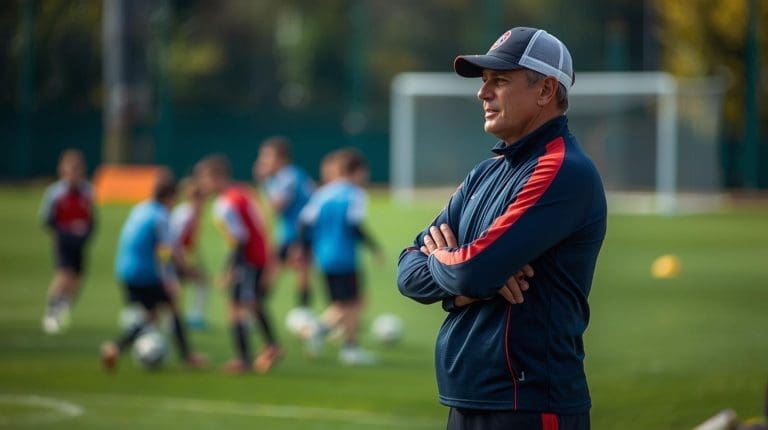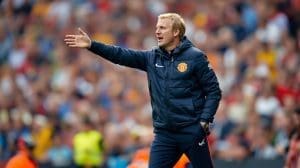
Emotional Control in Youth Sport: How Coaches Can Help Young Adult Athletes Thrive
With Matt Young
Emotional control is a phrase that gets thrown around a lot in coaching and sport psychology. But for coaches working with athletes aged 17 years old +, it’s far more than a buzzword, it’s the difference between an athlete who copes under pressure and one who crumbles.
In this week’s Demystifying Mental Toughness podcast, I spoke with Matt Young, a former professional footballer turned Anxiety and Fear Coach, who helps athletes and performers take control of their emotional world rather than being ruled by it. His ideas challenge the typical “manage your emotions” mindset, encouraging a deeper, more empowering approach.
So how can we apply this as youth sport coaches? Let’s unpack some key lessons and practical ways to help your players strengthen their emotional game.
- The Shift from “Managing” to “Controlling” Emotions
Many young athletes have been taught that emotions just happen to them. That anxiety, frustration, or fear are things to be managed. Matt challenges that idea.
“We don’t have emotions; we use them,” he explains. “When athletes understand that, they start to take back control.”
For a 19-year-old footballer or rugby player, this shift is huge. Instead of trying to suppress anxiety before a match, they can learn to ask:
- Why is this emotion showing up?
- What purpose is it serving?
- What do I want to feel instead?
Coaching takeaway: When a player reacts negatively in training or competition, encourage curiosity rather than judgment. Help them explore what the emotion is doing for them. This builds self-awareness and starts them on the path to control.
For more ideas, explore Helping Young Athletes Thrive Under Pressure, which discusses practical emotional reset tools for training and matches
- Emotional Control Is Built Through Process
Just as technical or tactical mastery requires repetition, so does emotional control. Matt highlights that many teams and individuals fall into “reactive” habits. Something goes wrong, and they panic, change everything, or blame someone.
Sound familiar? It’s the same with emotions. A player misses an easy chance, gets dropped, or receives criticism, and immediately reacts.
Coaching insight: Help your athletes put processes in place for emotional control.
- Encourage them to identify triggers, situations that consistently spark emotional reactions.
- Develop a “response routine”: one deep breath, eye contact, short cue phrase (“next play”).
- Reinforce consistency by debriefing emotional responses after games.
When players know their process, they’re not just reacting to chaos they’re responding with purpose.
For more support on this, check out:
>> Our Youth Sports Library
- The Role of Ownership
For coaches, one of the most valuable takeaways from the episode is Matt’s emphasis on ownership.
“It’s no one’s fault, but it’s everyone’s responsibility,” he says. “When we take ownership, we stop looking out there for answers and start looking within.”
At ages 17–21+, athletes can too often still rely on parents, coaches, or teammates to regulate their confidence and motivation. Teaching ownership means helping them internalise responsibility for their emotions and effort.
Practical ways to build ownership:
- After setbacks, replace “why did this happen to me?” with “what can I do now?”
- Use reflective questions: “What emotion helped you today?” “What emotion held you back?”
- Encourage players to design their own pre-game or recovery routines.
- Understanding the Three Psychological Needs
Matt and I discussed Self-Determination Theory, which outlines three core psychological needs that drive intrinsic motivation:
- Autonomy – feeling in control of decisions and emotion.
- Connection – feeling like you belong in the team or environment and receive support from your teammates and coaches.
- Mastery – a sense of improving and being competent.
For 17-21 year-olds, these needs are especially important. Many are transitioning to professional or senior sport or university life, where their previous structure and feedback loops disappear. A lack of autonomy or connection can quickly lead to frustration or quitting sport.
What coaches can do:
- Give players choices in training (e.g., selecting drills or goal-setting priorities).
- Build a team culture that rewards effort, not just results.
- Reinforce progress through feedback on controllables: attitude, focus, body language.
- Creating an Emotional Playbook
One of the most practical concepts Matt shares is the idea of an emotional playbook, a set of emotional “strategies” athletes can draw upon in pressure moments.
When a player feels anxious, it’s often because they’ve left a void they haven’t consciously decided how they want to feel. As Matt puts it:
“Anxiety shows up to fill the gap left by not being in control of how you want to feel.”
Help athletes design their own playbook:
- Identify emotions they want more of (e.g., calm, confidence, aggression).
- Connect each desired emotion with an action (breathing, self-talk, posture, cue word).
- Practice those emotional states regularly, not just before big matches.
This approach moves players from reacting to creating. They learn that they can engineer the emotional state needed to perform.
See also How to Help Kids Overcome Performance Anxiety, which connects well with this practice.
- The Environment You Create Matters
Matt’s third key takeaway is about environment. Even the most emotionally aware athlete will struggle if surrounded by negativity or blame.
He uses a simple analogy:
“If you want to lose weight but all your friends eat McDonald’s every day, it’s going to be tough.”
For coaches, this is a reminder that emotional culture is just as important as training structure.
Consider:
- How do you respond to mistakes? Do you show calm or frustration?
- Do you encourage peer support after poor performances?
- Does your team celebrate effort and learning, not just winning?
A psychologically safe environment empowers players to take ownership, admit struggles, and keep learning. For guidance, check 5 Ways to Create a Psychological Safe Sporting Environment
- Building Long-Term Emotional Skills
Helping young athletes master emotional control isn’t a quick fix. It’s a long-term development skill, much like speed, strength, or tactical awareness. But the benefits extend far beyond sport: better academic focus, healthier relationships, stronger self-belief.
Here’s how to embed it in your coaching programme:
- Model emotional control yourself. Players learn more from what they see than what they’re told.
- Integrate mental-skills work weekly, not just pre-competition.
- Reinforce progress: Highlight examples of composure and emotional resets.
- Collaborate with sport psychologists to offer individual or group workshops.
At Inspiring Sporting Excellence, we’ve found that once coaches normalise conversations about emotions, performance pressure becomes less threatening and players start performing more freely.
- Key Takeaways for Coaches
- Emotions are skills, not obstacles. Athletes can learn to use them effectively.
- Ownership drives change. Encourage players to focus on what’s within their control.
- Create emotional processes. Build consistent routines for recovery and reflection.
- Shape the right environment. Your team culture either supports or stifles emotional growth.
Final Thoughts
Working with 17–21+ year-old athletes means working with people in transition from youth to adult, dependent to independent, emotionally reactive to emotionally aware. As a coach, you have the power to shape how they experience that journey.
Teaching emotional control isn’t about being robotic or detached; it’s about helping players feel emotions without being consumed by them. It’s about equipping them with tools, processes, and ownership so that when life or sport throws chaos their way, they can stay grounded and focused.
As Matt Young reminds us:
“When you take ownership and control what’s inside you, the external world starts to look very different.”
You can also join our online community – THE SPORTS PSYCHOLOGY HUB – for regular Sports Psychology tips, podcasts, motivation and support.

Best Wishes
David Charlton
Global Sports Psychologist who is located near Newcastle Upon Tyne, UK and willing to travel Internationally. David also uses online video conferencing software (Zoom, Facetime, WhatsApp) on a regular basis and has clients who he has supported in the UK, UAE, Saudi Arabia, Australia and New Zealand.
Managing Director – Inspiring Sporting Excellence and Founder of The Sports Psychology Hub. With over 15 years experience supporting athletes, coaches, parents and teams to achieve their goals, quickly.






